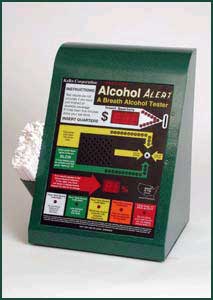Article
Kiosk uses straw, circuits to help stop drinkers from 'blowing it' on the road
Distributors, governments bellying up to self-service blood-alcohol tester.
April 4, 2004
Todd Schwanke has seen more than his fair share of drunken-driving mishaps causing injury and death. Unfortunately, tragic accidents are part of his job description as a Rochester, Minn., police officer.
So when Schwanke got the chance to help prevent these accidents, he jumped at it.
He became a distributor for Alcohol Alert, a self-service machine placed in taverns and bars to gauge a patron's blood-alcohol content before the person gets behind the wheel of a car.
Imbibers blow into the machine through a straw, triggering the blood-alcohol measuring system, and the feedback comes both from a computerized voice and in large LED bright, flashing lights.
"The Alcohol Alert machines offer a bartender a polite way to refuse service to a patron," said Schwanke. "For the most part the patrons have been pretty receptive about using the machines."
|
He and his partner, Ann Hanson, also a Rochester officer, have placed 10 of the machines in bars in their hometown and in St. Paul in a part-time business venture.
They are part of a growing list of distributors for the manufacturer, KeRo Corp., a Scottsdale, Ariz., company that has about 5,000 of the machines in circulation. They sell for about $4,000 apiece and are placed not only in bars and taverns, but also in bowling alleys, pizza parlors, restaurants, fraternal lodges, baseball stadiums and comedy clubs.
Sometimes the machines are leased by college fraternities and by couples for their wedding receptions.
Heady concept
Alcohol Alert is the brainchild of Ken Stoll, who said he's as much motivated by saving lives as he is about earning profits.
 |
"More than 17,400 people are killed each year in alcohol related car accidents, and that's intolerable," Stoll said. "There is a way around that, and I think we've found it."
Stoll said he spent $300,000 to develop Alcohol Alert. The machine has solid-state, printed circuitry, is computer-activated, and operates off self-calibrating software. It comes encased in an 18-gauge, cold-rolled custom steel cabinet.
The machines, which can be placed on tables or mounted, purge themselves after each use, and have no moving parts. Consumer cost is typically 50 cents per use.
"It's quite a complex piece of equipment," Stoll said.
Alcohol Alert got national media exposure last month when the town of Rockford, Mich. (pop. 4,600), announced plans to buy Stoll's kiosks for its three drinking establishments. The purchase marked the first time a municipality purchased from KeRo.
Rockford officials first considered purchasing the machines in late 2003, after Michigan became the 44th state to lower its drunk-driving standard to .08 percent blood-alcohol content.
"We've always tried to kind of think outside of the box," City Manager Michael Young told the Associated Press. "Our general standard is, we are looking out for the health, safety and welfare of our residents and visitors of our community."
"I think it's a very proactive approach to alcohol enforcement and prevention," said Rockford Police Chief Dave Jones. "We want to try to get somebody before they get in the car and cause injury or harm."
"Municipalities may turn out to be a good market for us," Stoll said.
Alcohol Alert results are normally fall to within .02 percentage points of blood-alcohol content. The results also may not be used in any legal proceedings. But even with those disclaimers, Stoll said, the kiosk's popularity is climbing as more people see it as a way to further the cause of responsible drinking.
"This machine didn't explode into the market right out of the starting gate," he said. "It's been an educational process, and that takes time. But I'm hopeful the business will go, go, go."
Depending on location, the machines on average reap revenues of $15 to "a couple hundred dollars" per week. They come with a one-year warranty for parts and labor.
Schwanke, the Rochester police officer, said he and his partner are optimistic their Alcohol Alert distributorship will grow.
"Minnesota is wide open as far as opportunities where to place our machines," he said. "Unfortunately, no matter what you do, some people will insist on driving home drunk. But overall I think we can make the streets safer with our machines."
 ChatGPT
ChatGPT Grok
Grok Perplexity
Perplexity Claude
Claude










